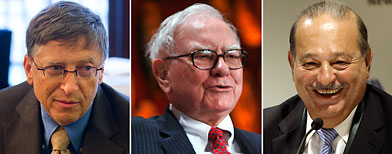While nearly all emerging markets showed solid gains, wealth creation is moving at an especially breakneck speed in Asia-Pacific. The region now has a record 332 billionaires, up from 234 a year ago and 130 at the depth of the financial crisis in 2009. Sizzling stock markets are behind the surge. Three-fourths of Asia's 105 newcomers get the bulk of their fortunes from stakes in publicly traded companies, 25 of which have been public only since the start of 2010.
America's wealthiest still dominate the global ranks, but the U.S. is losing its grip. One in three billionaires is an American, down from nearly one out of two a decade ago. It has 10 more than last year but 56 fewer than its 2008 peak. The U.S. is adding new billionaires at a much slower pace; just 6% of its 413 billionaires are new this year compared with 47% of China's and 30% of Russia's.
Still there are plenty of inspiring newcomers who figured out clever ways to get rich. The most obvious example is the success of Facebook, whose soaring valuation over the past couple of years — based on the most recent institutional round the company is worth $50 billion — has spawned six billionaires. Leading the group is Facebook's CEO Mark Zuckerberg, whose fortune jumped 238% to $13.5 billion in the past year. Also joining him in the world ranks are his cofounders Eduardo Saverin and Dustin Moskovitz, its first president Sean Parker (played by Justin Timberlake in "The Social Network") and the Russian Internet investor Yuri Milner. Moskovitz, 26, is eight days younger than his former college roommate Zuckerberg, making him the world's youngest billionaire.
The frenzy among big investors for all things social pushed up private market values of online gaming outfit Zynga and online group-buying site Groupon, creating two more new billionaires, Mark Pincus (who taught people to farm on Facebook) and Eric Lefkofsky (who was Groupon's lead investor).
Other notable American newcomers include Do Won and Jin Sook Chang, the cofounders of Forever21, and Chris Cline, who owns 3 billion tons of coal reserves, mostly in Illinois.
Why do we spend so much time counting other people's money? Because these moguls have the power to shape our world. Telecom billionaire turned prime minister Najib Mikati is keeping Lebanon's government together. Ernesto Bertarelli, who lost the America's Cup to Larry Ellison last year, is now focusing on saving the oceans from mass extinction. Gates and Buffett have already traveled to three continents working to change giving practices among the ultra-rich.
Where their inspiration leads, we will follow.
A note on methodology: More than 50 reporters in 13 countries worked on compiling the list this year, valuing individuals' public holdings, private companies, real estate, yachts, art and cash. Net worths were locked in using stock prices and exchange rates from Feb. 14.
No. 1 Carlos Slim Helú & family
Net Worth: $74 billion ↑
Source: Telecom
Citizenship: Mexico
The world's richest person for a second year in a row, the Mexican telecom mogul is also the year's biggest gainer, having added $20.5 billion to his fortune and widened the gap between him and No. 2, Microsoft cofounder Bill Gates, to $18 billion. A 19% rise in the Mexican stock market, a stronger peso, and successful mining and real estate spinoffs from conglomerate Grupo Carso all contributed to the astonishing increase. He also merged his fixed-line telecom company into America Movil, Latin America's largest wireless carrier; the Slim family stake in that holding accounts for 62% of his net worth. He has other holdings in retailer Saks and the New York Times. Recently unveiled a new building for his Soumaya Museum, which houses his vast art collection. It is open to the public for free.
No. 2 Bill Gates
Net Worth: $56 billion ↑
Source: Microsoft
Citizenship: U.S.
Microsoft mogul, futurist and America's richest person has, with help from billionaire buddy Warren Buffett, convinced nearly 60 of the world's wealthiest to sign his "Giving Pledge," promising to donate the majority of their wealth to charity either during their lifetime or after death. He is no longer the planet's richest person, but that's because he's given away $30 billion to his foundation. The Gates Foundation, the world's most influential charity, tackles tuberculosis and polio and funds famine-resistant crops to fight hunger. He is calling for a higher sense of urgency in AIDS vaccine development and also pushing for better tools to rate teacher performance. Gates holds 70% of his wealth in investment fund Cascade, dabbling in everything from autos to hedge funds to Mexican Coke bottler Femsa; the rest of his wealth is held in Microsoft stock.
News Source: Yahoo

0 comments:
Post a Comment